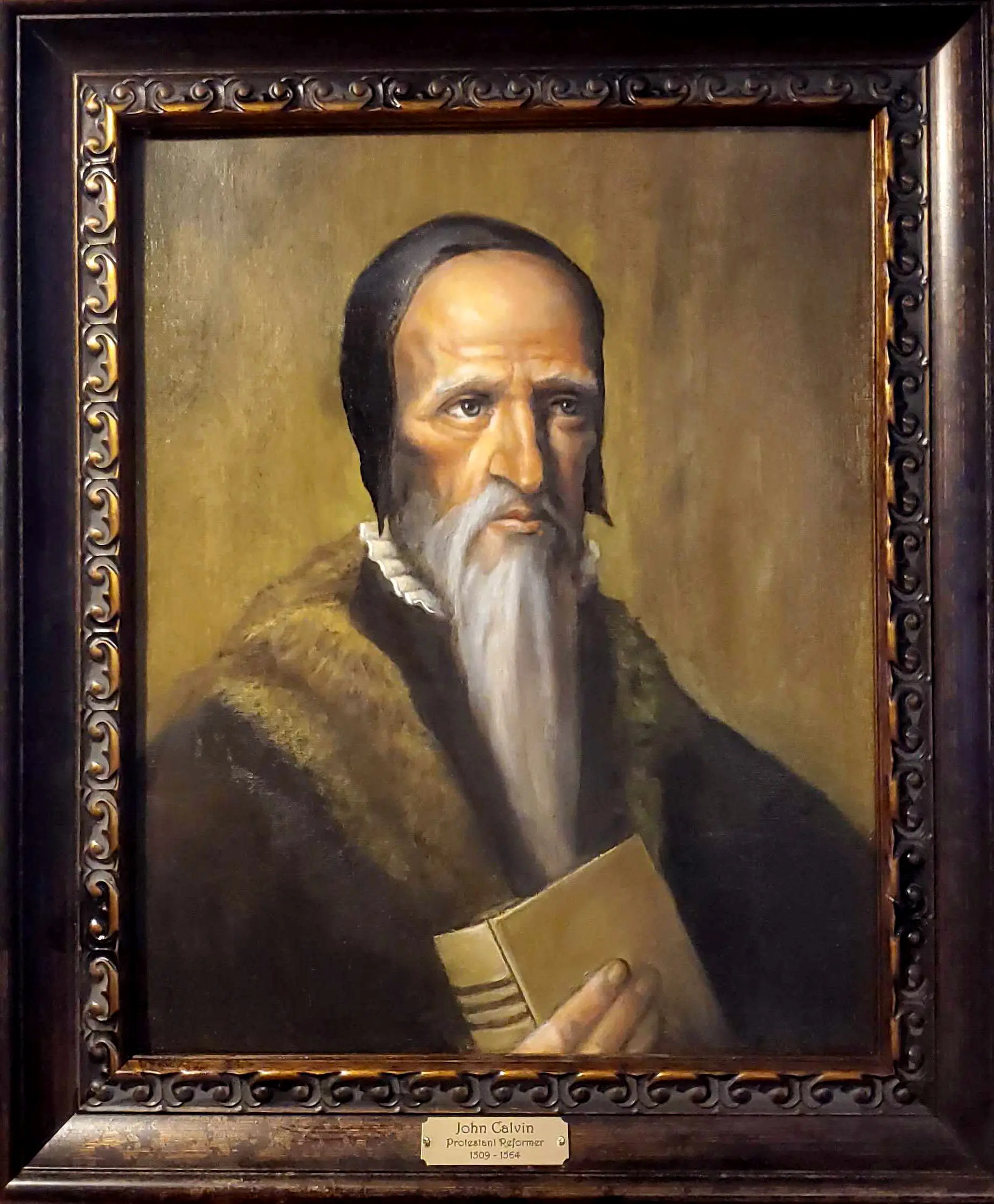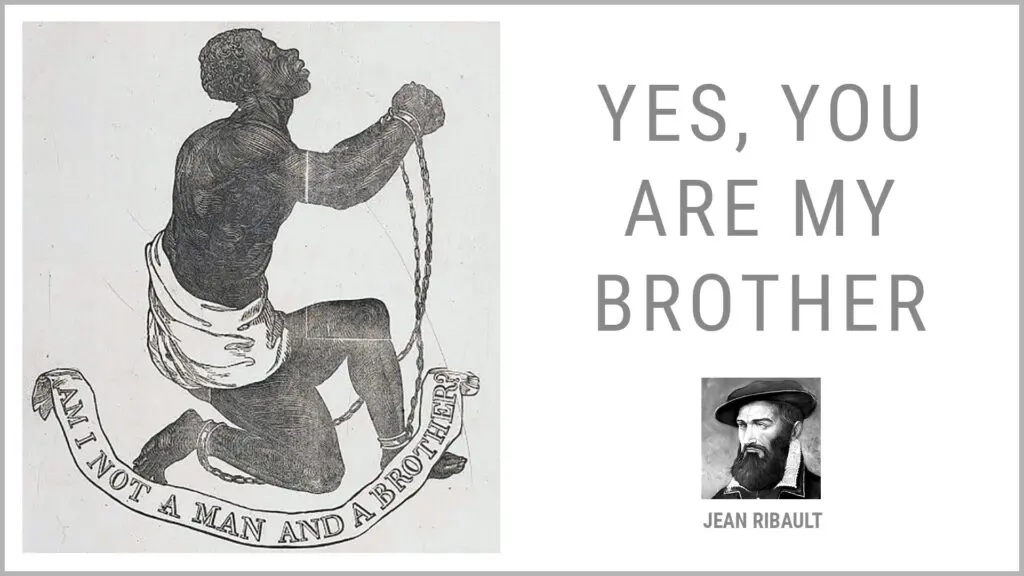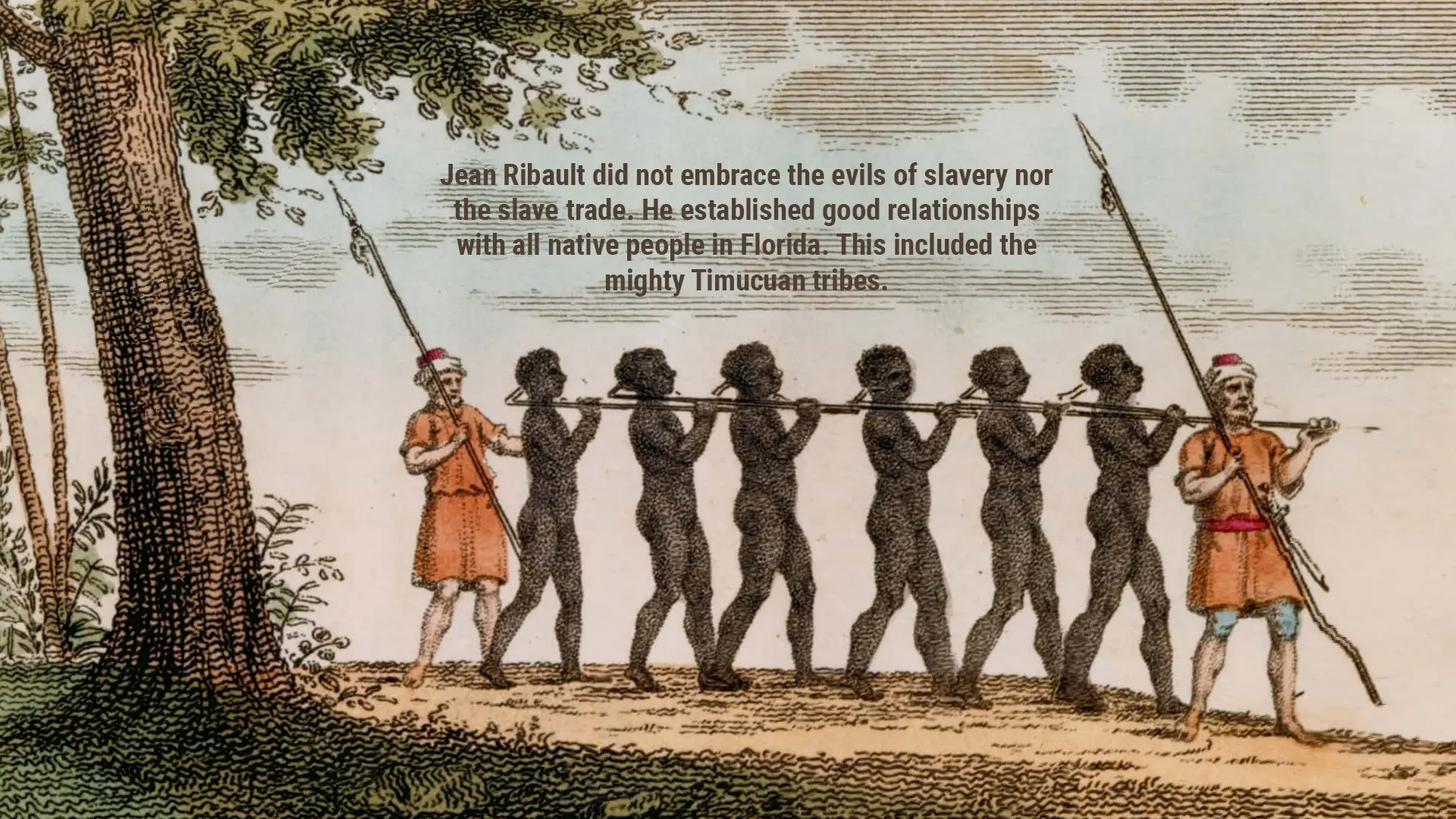The truth about Jean Ribault and slavery
No one disputes the fact that slavery is sinful and morally wrong, no matter who practices it. Neither did Jean Ribault. Jean Ribault did not own slaves. He did not enslave any native people groups during his expedition to South Carolina (Charlesfort) and Florida (Fort Caroline).
In the last few years, there has been a lot of misinformation from those who are politically determined to injure the reputation of historical figures like Jean Ribault and the French Huguenots. These historical “half-truths” are rarely researched thoroughly and seem more bent on ignoring the facts and pushing a particular cancel culture narrative, rather than reflecting accurately on the past. Good or bad, history has a lot to teach us, and it’s important that we listen and learn, not cancel. Fortunately, in the case of Jean Ribault, we have a story that highlights goodwill, cultural respect, and moral character. It is an inspiring journey of hope and purpose.
So what is the truth about Jean Ribault and slavery? Did Jean Ribault and his French Huguenot colonists own slaves? Did they enslave the native Timucuan people upon their arrival in Florida in 1562? Let’s quickly look at these questions.
Jean Ribault did not own slaves
First, it’s important to step back and look at the high-level mission of Jean Ribault’s expedition to the new world. Jean Ribault’s primary mission was NOT to find gold, capture slaves for the slave trade, or expand the global military empire of France. The primary mission of Jean Ribault was to find a new home for French Huguenots escaping religious persecution in France. Certainly, to some degree, the honest trading of goods and the national identity of the French were inevitably part of their purpose. Still, it was secondary and subject to the primary mission in every way.
During the 3 voyages sponsored by the Huguenot Admiral Coligny and lead by Captain Jean Ribault and René Laudonnière, the ships did not count any African slaves among their crew or inventory. Unlike the Spanish, who widely used slave labor as part of their early expeditions, the French Huguenots under Jean Ribault did not. In fact, even though slavery was widely accepted in the 16th-century world, even among African and native people groups themselves, it was not part of the culture Jean Ribault brought with him to the new world in 1562.
“When he arrived at the riverbank, right away he saw many male and female Indians who had come to this place to receive the Frenchmen with gentleness and kindness. This was emphasized by the speech of their king and by the presentation of the chamois skins to our captain.”
– René Laudonnière 1562
Jean Ribault’s initial interaction in 1562 and subsequent future interactions with the many native people, such as the Timucua of Florida, were healthy, well-received, and positive. The native leaders enjoyed their engagement with Jean Ribault and continued to view him as a friend. Even 3 years later, upon his return to Florida in 1565, it’s recorded that the Timucuan chiefs were pleased to see Jean Ribault again. They recognized him because of his “great beard” and greeted him enthusiastically. In the quote below, you’ll see how Laudonnière makes a special mention of this fact. He also details how upon reminding the Timucua people “who these men were” and that they were from the first voyage in 1562, they brought Ribault gifts.
The next day indians arrived from everywhere to know who these men were, and I explained that these were those who came in 1562 and erected the stone which was at the entrance of the river. Some of them remembered Ribault, because of his great beard. He received many presents from those coming from adjoining villages. Among these he recognized some. The kings Omoloa, Saranay, Allicomany, Malica, and Casti came to visit and welcomed him with presents according to their custom.
– René Laudonnière 1565
Now, if someone visited your home and captured and enslaved your family members, then came back 3 years later and knocked on your door, would you be happy to see them? I don’t think so. Add to this that these native people were not poor, destitute men. They were powerful tribal chiefs with military forces, weapons, and resources enough to destroy the small band of French Huguenots and Jean Ribault any time they so desired.
Jean Ribault did not enslave the native people of Florida
We can often overcomplicate conversations by ignoring the simple facts in plain view. In this case, the facts clearly demonstrate not only did Jean Ribault not bring with him any African slaves, but he was also loved and respected by the native people he met in the new world. The first-hand written account by René Laudonnière about Jean Ribault is never hostile toward the Timucua and any other native people group in Florida. His tone nor words do not speak of evil or impending treachery. Ribault did not come as a wolf in sheep’s clothing. Ribault did not pose as a friend, only to turn on the Indians later as the Spanish conquistador Cortés did to Aztec King Montezuma in Mexico.
The friendship was so great between our people and King Audusta that almost everything was shared in common, and this Indian king did not do anything unusual without advising us of it. So as the time approached for the celebration of the feast of Toya, strange ceremonies to tell about, he sent ambassadors to the French to invite them to take part and assist
– René Laudonnière 1565
At the end of the 2nd Voyage, and as René Laudonnière was preparing to depart back to France, he makes an interesting comment in his memoirs. As they are leaving Florida and going back to France, the Huguenots no longer need the goodwill, assistance, food resources, or military protection of the Indians. Yet, René Laudonnière takes the time to share some kind words. He details the grateful attitude of his men toward their Indian friends. His words don’t reflect an attitude of a slave master and lowly slave. Rather, they are words of kindness and brotherly love amongst equals… neighbors.
Our men were now as happy as could be. They were generous toward the Indians in leaving the country and gave them merchandise that remained. By this means they left the Indians fully satisfied as they departed.
– René Laudonnière 1565
Even under the Queen’s command to bring two native Indians back to Europe with him, Laudonnière, in his memoirs, is careful to mention by what permission Ribault made this arrangement. Any person who arrived in the new world with the intent to take by force whatever he wanted would never make such a clarification. He wouldn’t need to, but Huguenot leader René Laudonnière did (and by extension Jean Ribault as Laudonnière was Ribault’s 2nd in command and under his authority). It clearly shows he was sensitive to the difference between the idea of taking someone by force (enslaving them) vs. having them join the voyage back to France voluntarily. A pro-slavery commander wouldn’t care what you thought about it. He would chain you up and take you, whenever and wherever he chose to do so. But Jean Ribault’s expedition did not do this. In fact, many of the native Indians did change their minds after finding out how far away they would be going. Missing their families, they often jumped ship, returning to their homes. Ribault, despite his disappointment, did not hunt them down but accepted the outcome of their departure.
Several days afterward, Jean Ribault decided to return among the Indians who inhabited the west arm of the river… His plan was to get two Indians of that place and to take them back to France, as the queen had commanded him. Having arrived at this conclusion, we returned to the same place where we had first found the Indians, and we took two Indians by permission of their king. Thinking that they were more favored than the rest, they thought themselves very fortunate to be with us”
– René Laudonnière 1562
The faith of the Huguenots condemned Slavery
Another important factor that needs to be considered in confirming that Jean Ribault did not own slaves, is the very foundation of the Huguenot faith itself. Most notably, the teachings of the French protestant reformer John Calvin.
The Reformation had just begun in 1517 under German monk Martin Luther. It quickly spread to France and was picked up by the young Humanist intellectual John Calvin. He would rise to be one of the greatest champions of the reformed movement and is consider by many historians to be one of the top 10 most influential men of all time.
John Calvin was alive and preaching in France during the lifetime of Jean Ribault and his expedition to the new world. He condemned slavery as “unatural” and “detestable”.

Calvin was the leading voice of the reformed movement, or the Huguenots in France. So much so, that the Huguenots are often referred to as Calvinists. It was this Calvinist teachings that the Huguenots were being killed for believing and thus, the reason why Jean Ribault was leading the expedition to Florida in the first place. Let’s briefly take a look at what John Calvin taught the Huguenots, on the subject of slavery.
First, context. The modern European slave trade in Africa began in 1441, when 12 men from Cabo Branco were captured and taken to Portugal. Here, slave labor on sugar plantations existed as early as 1452. In 1454 Pope Nicholas V issued Romanus Pontifex, a bull granting the Portuguese a monopoly in trade with Africa. Ignoring this “monopoly,” Spain also forged a way into the trade, but quickly outlawed it in 1542, becoming the first modern nation to do so. Concurrently, during the second half of the 16th century, the number of slaves arriving in the Americas grew exponentially. Slavery had little or no presence in 16th century France, Calvin’s immediate context. It wasn’t until 1594 (30 years after Jean Ribault came to Florida) that the French ship L’Espérance of La Rochelle is known to have participated in the slave trade. France did not become involved in the slave trade until after 1620, more than half a century after Calvin’s death and the expedition of Jean Ribault to new world. Thus the only personal contact Calvin and potentially Jean Ribault himself, would have had with any form of slavery is the institution of serfdom in the northern regions of France. Phentermine for weight loss http://medicalspecialistsoffairfield.com/phentermine/
The slave trade in France didn’t exist during the lifetime of John Calvin & Jean Ribault
However, as mentioned above, John Calvin and Ribault were aware of the slave trade. They knew, for example, that taking captives and selling them into slavery was common practice in Spain during his lifetime, and Calvin states that he frequently laments the presence of slavery there and among the Turks.
John Calvin condemned slavery in his preaching
Calvin addresses slavery in several of his sermons. He highlights the fact that slavery is not rooted in the natural order of things (nor any principle of natural law), but rather is a detestable postlapsarian phenomenon, a consequence of sin, the fall of humankind, and the marred imago Dei. Consider Calvin’s sermon on Ephesians 6.
“For each human being is a reasonable creature. And this derived from sin, as one evil triggers another, until things descend into utter confusion. But if we examine the rights which masters had, we shall conclude every time that this is something which is contrary to the whole order of nature. For we are all fashioned after the image of God, and it was thus altogether too exorbitant that a reasonable creature upon whom God has stamped his mark should be put to such insulting condition. But such are the fruits of the disobedience and sin of our first father Adam: it has resulted in all things being turned upside down.”[5]
So also, Calvin’s commentary on Genesis 12:
“Soon after the deluge it happened that most of the human race lost the freedom that was by nature common to everyone. Now, whether the first enslaved humans had been crushed by the conquest or compelled by poverty, the natural order had certainly been corrupted by violence; for human beings had been created to have and sustain society to their mutual advantage. And although it is necessary for some to have stewardship over the others, we ought rather to maintain equality among brethren.
It is quite clear that John Calvin would have heavily influenced his Huguenot followers to reject slavery as immoral and sinful. It is also clear that whatever corruption of theology used by future “pro-slavery” land owners in the America’s it was not that taught by John Calvin nor his first generation Huguenot followers.
Jean Ribault and the French Huguenots came from the country of France which did not engage in the slave trade until 60 years (1620) after the lifetime of Jean Ribault (Ribault expedition 1562 – 1565).
The belief system of the French Huguenots condemned the evil practice of slavery during the lifetime of Jean Ribault.
Jean Ribault, a legacy of hope
Jean Ribault and the expedition of the French Huguenot in Florida is a story of human struggle and religious freedom. Escaping brutal persecution at the hands of others was at the very core of their purpose in the new world. In coming to Florida, the Huguenot hoped to find a home to live free from oppression and worship God according to their own conscience. Jean Ribault embodied this ideal. He demonstrated his position on slavery where it counted most, how he treated and interacted with the native people of Florida… as equals, as neighbors. It is a humble reminder that in the passionate pursuit of what we believe to be most important, we must never forget kindness and brotherly love. Thank you for your great example, Captain Ribault.

